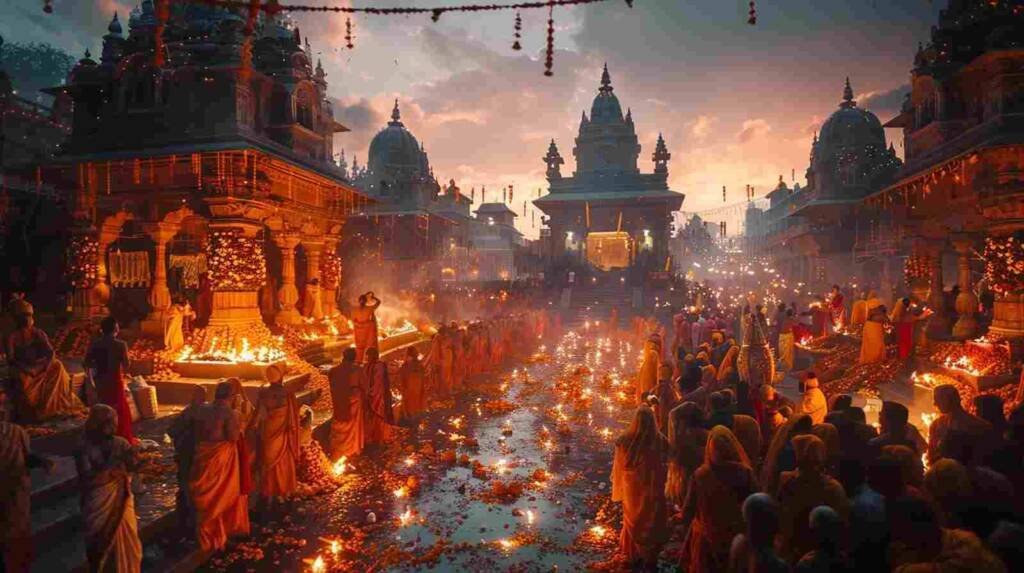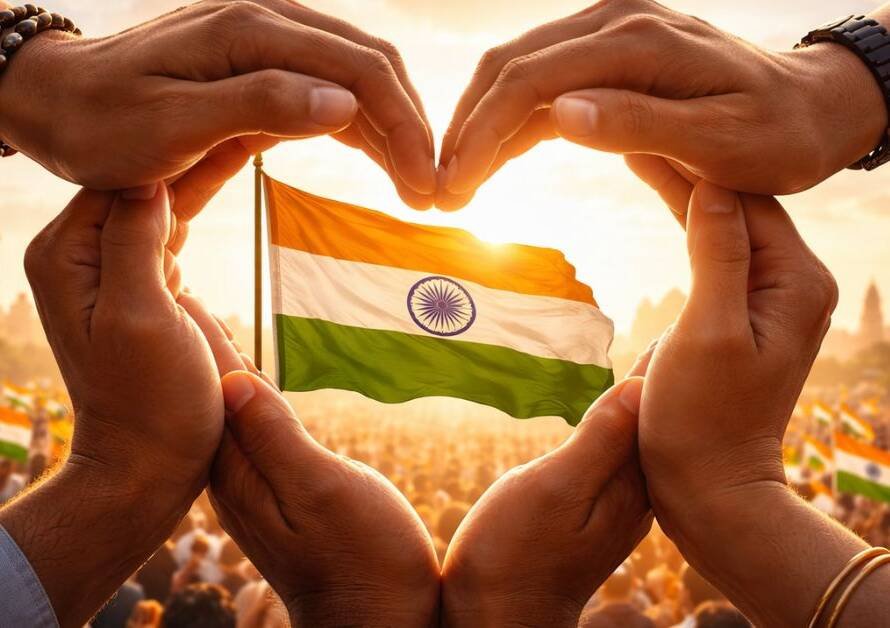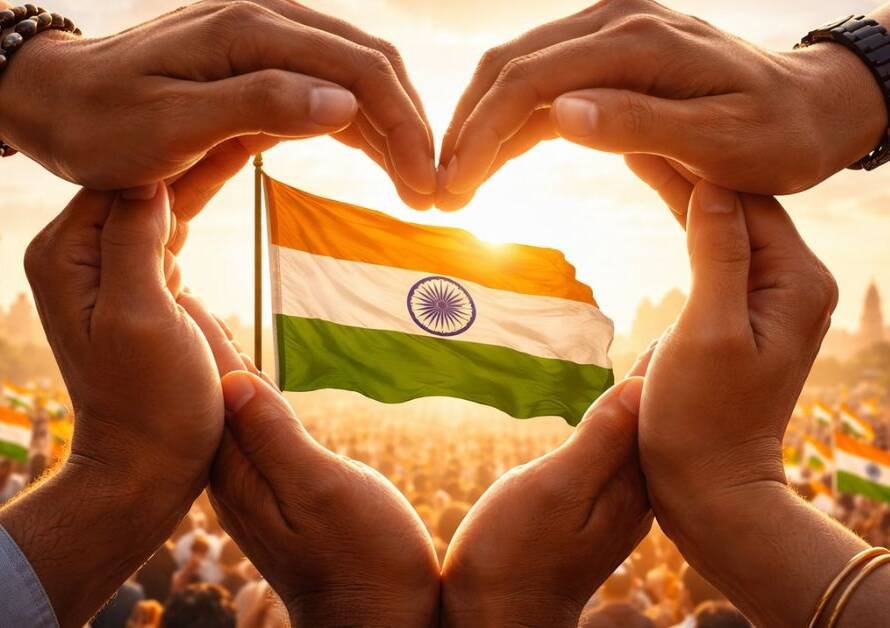Hindus across the nation are finally waking up to the imminent danger that looms over both our religion and our nation. For too long, we have been divided by caste, regional differences, and internal conflicts, while external forces have plotted our downfall. Today, more than ever, the unity of Hindus is not just a necessity—it is a matter of survival for our religion, culture, and national identity.
The slogan “जात पात की करो विदाई, हिंदू हिंदू भाई-भाई” (Say goodbye to caste differences, Hindus are brothers) is echoing across the land, signaling the beginning of a new consciousness among Hindus. If we continue to unite under this banner, our future will be bright, and we will reclaim our rightful place as a Vishwaguru (world leader). However, if we allow ourselves to remain trapped in the web of casteism and division, the fate that has befallen Hindus in Pakistan, Kashmir, Bangladesh, and Bengal could soon be ours. When our very existence is under threat, what significance will caste have?
We must open our eyes to the real enemies—those disguised as politicians, preachers, and jihadists, who are quietly working to dismantle the very foundation of Hinduism and the nation itself. The rise of radical ideologies, appeasement politics, and cultural erasure is a calculated effort to weaken Hindus, and unless we act now, the future of our religion is at risk.
Recently, leaders like Yogi Adityanath have taken bold steps to tackle extremism and protect the integrity of our nation. His approach has earned praise from global powers like Israel, which has recognized the effectiveness of his strategy against terrorism. This is not just a moment of pride but a clear indication of the path we must follow. Other states like Assam, under the leadership of Himanta Biswa Sarma, have also started implementing similar measures, showing that strength and unity can curb the spread of anti-national and anti-Hindu forces. Yet, it is disheartening that institutions like the Supreme Court, with their restrictive rulings, are inadvertently tying the hands of those trying to safeguard our nation.
For the last decade, leaders like Narendra Modi and Yogi Adityanath have been tirelessly working toward building a strong and unified Hindu nation. However, their efforts alone are not enough. We, the Hindu masses, must rise to the occasion. It is time to embrace the teachings of the Bhagavad Gita—not just as a religious text but as a guide to action. Lord Krishna himself showed us the way in the Mahabharata, using strategy, wisdom, and, when necessary, force, to achieve righteousness. In this Kaliyug, we too must adopt a pragmatic approach, recognizing that sometimes harsh measures are required to protect Dharma.
As we look around the world, it becomes clear that countries like Israel and Britain are taking a stand against radicalism, safeguarding their national identity and security. We must follow their example and unite globally against the threats of jihad and terrorism. World peace is impossible without addressing these dangers head-on.
The recent remarks by Congress leader Mallikarjun Kharge, who brazenly stated that Congress would take money from Hindus to distribute among Muslims, further highlights the deeply entrenched anti-Hindu sentiment that exists within certain political factions. This divisive rhetoric should serve as a wake-up call for all Hindus to abandon illusions of secularism that have only weakened our community and support leaders who truly represent our interests.
Moreover, we need to reflect on our own shortcomings. Many of us aspire for government jobs, preferring the security of a salaried position with minimal work, while neglecting the spirit of entrepreneurship and hard work. Meanwhile, the Muslim community, which prioritizes its religious practices, continues to thrive through business and unity. We need to learn from this and reignite our commitment to self-reliance, hard work, and collective strength.
Now is the time for Hindus to shed complacency. We must rise above caste, class, and regional divisions and unite as one powerful force. The looming threat is real, and the enemies of Hinduism are determined. But with the right leadership, unity, and commitment, we can protect our religion, secure our nation, and reclaim our place as a beacon of spirituality, wisdom, and strength.
The awakening has begun—let us not let this momentum falter. Together, we will save Hinduism and make India the Hindu nation it was always destined to be. The future of our faith, our culture, and our country depends on what we do next.
Here are some relevant examples and case studies that align with the narrative of Hindu unity and the effort to safeguard Hindu religion and culture in modern India:
- The Ayodhya Ram Mandir Movement
Case Study: The Ram Janmabhoomi movement is one of the most significant examples of Hindu unity in the post-independence era. It began as a movement to reclaim the birthplace of Lord Ram in Ayodhya, which was disputed by the existence of the Babri Masjid. After decades of political, social, and legal struggle, the Supreme Court’s historic decision in 2019 paved the way for the construction of the Ram Mandir.
Impact: This movement highlighted how the collective will of the Hindu population, under the leadership of key figures like LK Advani and organizations like the Vishva Hindu Parishad (VHP), could succeed in reclaiming cultural and religious heritage. It demonstrated that, when Hindus unite for a common cause, they can overcome legal, political, and communal hurdles.
Lesson: The success of the Ram Mandir movement serves as a rallying point for Hindus, showing that unity and persistence can protect and restore the nation’s spiritual heritage. This has ignited a larger discussion about reclaiming other historical temples and religious sites across India. - Israel’s Approach to Security and Self-Preservation
Case Study: Israel’s model of national security and self-defense against terrorism is often cited as an example for India. Israel, surrounded by hostile neighbors, has developed one of the most effective counter-terrorism strategies globally, ensuring its survival despite numerous threats. The nation’s aggressive stance against terrorism has been praised by global leaders, including India’s political figures like Yogi Adityanath.
Impact: Yogi Adityanath’s style of dealing with terrorism and communal violence, especially in Uttar Pradesh, has been compared to Israel’s tough stance on security issues. His government has taken swift action against rioters and those involved in terrorist activities, sending a strong message of zero tolerance for anti-national elements.
Lesson: The parallel between Israel’s approach and the need for a similar stance in India is clear. Just as Israel has had to defend its identity and survival, India too must adopt strict measures to safeguard its religious and cultural integrity, particularly from radical elements that seek to destabilize it. - Assam’s Citizenship and NRC Drive
Case Study: Assam, under the leadership of Chief Minister Himanta Biswa Sarma, has been one of the most vocal and active states in curbing illegal immigration and ensuring the protection of indigenous populations, many of whom are Hindus. The National Register of Citizens (NRC) and Citizenship Amendment Act (CAA) were key policies aimed at addressing the demographic shift in Assam due to illegal immigration from Bangladesh, which has led to social and communal tension.
Impact: The policy faced significant opposition, particularly from groups sympathetic to illegal immigrants, yet the government continued to push forward. This effort has been crucial in preserving the cultural and demographic identity of Assam and has set an example for other states facing similar issues of demographic imbalance due to unchecked immigration.
Lesson: This case shows the importance of strong political leadership that prioritizes the interests of native populations over appeasement policies. It also reflects the need for national policies that protect the cultural and religious identity of India in the face of changing demographics. - Kashmir’s Reorganization and Abrogation of Article 370
Case Study: The abrogation of Article 370 in August 2019 by the Modi government, which stripped Jammu and Kashmir of its special status, was a landmark decision. This bold move was seen as an effort to integrate the region fully with the rest of India, both politically and socially, and to curtail the influence of radical separatist elements.
Impact: The decision has brought about major political and social changes in Kashmir, including opening up the region for development and investment. Additionally, it has weakened the influence of extremist and separatist groups. The administration’s move sent a strong message that India will not compromise on its territorial integrity and cultural unity.
Lesson: The case of Kashmir demonstrates the importance of decisive governance when it comes to national integrity and security. The government’s actions in Kashmir highlight the necessity for Hindus to remain united in the face of challenges that threaten national unity. - Vocal Leadership Against Radicalism: Yogi Adityanath
Case Study: Yogi Adityanath has been one of the most vocal and active leaders in dealing with radical elements in Uttar Pradesh. His policies against ‘Love Jihad,’ anti-Hindu violence, and strict action on rioters have made headlines and sent a clear signal to anti-national elements. His approach has been widely appreciated, not just in India but by global figures, as seen in Israel’s endorsement of his policies.
Impact: His government’s crackdown on those who indulge in violent protests or terrorist activities has reduced such incidents in Uttar Pradesh. His no-nonsense approach is often cited as a model for other BJP-ruled states.
Lesson: Yogi’s leadership provides a blueprint for other states in how to manage internal security and protect the Hindu way of life. His emphasis on Hindu unity and strict law enforcement has earned him support among those who feel that Hindus have been historically marginalized. - Hindu Self-Reliance: Economic Strength Through Entrepreneurship
Case Study: One key issue plaguing the Hindu community has been the over-reliance on government jobs and the avoidance of entrepreneurship. In contrast, the Muslim community has thrived through small businesses and trade. In Gujarat, under Modi’s leadership, there has been a push for self-reliance and entrepreneurship among Hindus, leading to economic upliftment of the community.
Impact: By encouraging entrepreneurship, states like Gujarat have seen a rise in Hindu-owned businesses, which not only provides economic stability to the community but also strengthens cultural pride and local industries.
Lesson: The Hindu community needs to embrace entrepreneurship and self-reliance, moving away from government dependency. By building their economic base, Hindus can create a strong foundation that supports cultural and religious preservation.
Next Steps for Hindus:
Unity Above All: Hindus must rise above caste, regional, and sectarian divides to present a united front. As the examples above demonstrate, unity is key to both religious and national survival.
Support Pro-Hindu Leaders: The leadership of Modi, Yogi, and others working for Hindu causes must be fully supported in every election. This requires not just voting, but active participation in political discourse and defending pro-Hindu policies.
Legal and Social Mobilization: Hindu legal professionals, activists, and community leaders must actively challenge any legal roadblocks that hinder the progress of Hindu-centric policies. This includes reversing harmful Supreme Court judgments or challenging policies that weaken Hindu interests.
Strengthening Hindu Identity: Educational reforms that emphasize Hindu culture, values, and history should be promoted. There should be a strong focus on reviving traditional knowledge systems, rituals, and practices that instill a sense of pride in Hindu heritage.
Economic Self-Reliance: Hindus must focus on entrepreneurship and self-employment to build a strong economic foundation. Economic stability will empower the community to take on greater roles in society, culture, and politics.
Through these efforts, Hindus can secure the future of their religion and culture, ensuring that the threats of radicalism, political opportunism, and cultural erosion are kept at bay.







